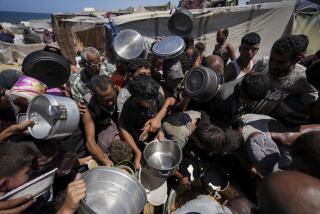Iraq Bars Airlines of Other Nations on Hostage Trips : Gulf crisis: The government says only the national carrier may transport women and children. Hussein may be trying to use them as leverage to break the blockade.
- Share via
BAGHDAD, Iraq — Iraqi officials threw yet another obstacle in the path of thousands of foreign women and children trying to leave the country Monday, barring any airline other than the Iraqi national carrier from landing in Baghdad.
The government said that only Iraqi Airways planes may be used, on the grounds that the state-run company needs the business.
Western diplomats said that Iraqi President Saddam Hussein appears to be trying now to use the women and children he said last week were free to leave as leverage to break the U.N. economic blockade against his country.
Repeating an implied threat made in the first days after the embargo was established, Iraqi Foreign Minister Tarik Aziz on Monday urged nations with many citizens in Iraq or Kuwait to supply food to Iraq, saying it could not be responsible for what happened to them as a result of shortages.
The Iraqi News Agency said Aziz met in Baghdad with Cornelio Sommaruga, president of the International Committee of the Red Cross, and “urged states with many nationals in the country to take urgent steps to provide Iraq with food supplies to enable it to meet their requirements.
“Iraq, which is suffering from the imperialist blockade, will not be responsible for food shortages from which these nationals are suffering,” the agency quoted Aziz as telling Sommaruga.
Iraq instituted food rationing on Saturday.
The Iraqi press had warned earlier that the tens of thousands of foreign nationals, including their babies, would be among the first to suffer from any food shortages.
The news agency also announced that Iraq had suspended repayment of its foreign debt in response to the U.N. trade embargo. Iraq’s outstanding debt has been estimated at $30 billion to $35 billion, most of it owed to the United States, Britain, France, the Soviet Union, West Germany and Japan for purchases of weapons, technology and food.
The announcement about banning foreign airlines immediately deterred the expected arrival of jets from Britain, France and Switzerland to pick up women and children. Other countries, including the United States, had expressed interest in sending passenger planes.
Britain’s Virgin Airways said it had received permission to fly into Baghdad, but permission was revoked in a telex on Sunday.
French Foreign Ministry spokesman Daniel Bernard said in Paris that the Iraqis had initially approved landing rights for an Air France Airbus, which was to pick up 200 women and children with exit visas, about one-fourth of them French.
Bernard indicated that Iraq had set conditions for landing rights for the French plane. He did not say what the conditions were but said France would not meet them.
“Iraqi authorities have once again gone back on their position,” Bernard was quoted as saying by news agencies. He denounced Iraq’s efforts to “complicate, slow down and make more difficult” the return of the women and children.
Britain, which has more nationals in Iraq and Kuwait than any other Western country, said it is still seeking to clarify the apparent ban on Western flights.
“We’re still pressing for details,” said a Foreign Office spokesman, adding that the British Embassy in Baghdad had not been officially informed of a ban.
Some foreign hostages have been able to leave Iraq. More than 700 of them from 20 countries, including 129 Americans, got out Sunday, some on an Iraqi Airways Boeing 747 and others on a Lufthansa charter.
On Monday, 22 Westerners, including eight Americans, arrived by air in Amman, Jordan, from Iraq and 120 Bulgarians got out by road.
The snag over the airlift came amid growing alarm about the fate of all foreigners in conquered Kuwait. American, European and Japanese diplomats have been meeting to design ways of evacuating the city of the hostages, who under Hussein’s “humanitarian” order were to have been freed six days ago.
“Our focus has shifted to Kuwait and we want to provide a direct way out,” said a diplomat in Baghdad.
In Bonn, the West German Foreign Ministry announced that 98 West German women and children have left Kuwait for Baghdad by bus. Spokesman Juergen Chrobog said that since Iraq is refusing to allow Western airlines to land, these and other women and children might have to leave Iraq by road through neighboring countries.
The British government also announced plans to bring out its citizens from Kuwait by bus. The Foreign Office in London said Iraqi authorities have been informed that a convoy of 10 buses will leave at dawn today, taking up to 500 British women and children for a 500-mile drive across the desert.
About 2,500 Britons are still in Kuwait. An announcement on British Broadcasting Corp. radio told those wanting to join the convoy to take food and water, hand luggage and one suitcase.
Once in Baghdad, the Foreign Office spokesman said, the 500 will be housed in hotels while their exit visas are arranged. They then hope to continue overland to neighboring Jordan or to fly to Amman en route home.
The Foreign Office spokesman said Britain is considering chartering Iraqi airliners to evacuate Westerners.
“We’re not talking about a ransom here to get people out. We’re talking about paying a commercial fare,” he said. “We are willing to take any route which we can use to get our citizens out. Any option is as easy or as difficult as the Iraqis choose to make it.”
France and Australia had plans for a similar overland evacuation from Kuwait, but there was no word from the United States.
Virgin Airways said it is sending a jumbo jet to Jordan today to pick up about 150 British, European and U.S. refugees from Iraq and Kuwait. The plane is also to deliver food, blankets and medical supplies after an appeal from King Hussein of Jordan to Virgin’s chairman, tycoon Richard Branson.
It was a dispute over air rights that created the first hitch in the evacuation of women and children last Friday. Hussein’s government announced at that time that it wanted Britain, France and the United States to allow Iraqi Airways to fly into those countries to collect stranded Iraqis abroad as a humanitarian gesture.
At the time, foreign analysts here said that Iraq was upping the ante in the hostage drama. Now, creating a chink in trade sanctions seems to be the goal, Western diplomats here said Monday.
“Iraq seems to be looking for a way to break the embargo,” said one.
Iraqi officials say they are only responding to a routine complaint from the national airline against “unfair competition.”
“We think Iraqi Airlines should be given priority,” said government spokesman Naji Hadithi. “It is unfair for other airlines to be able to come if Iraqi jets cannot go anywhere.”
Only Jordan’s international airport in Amman permits regular traffic of Iraqi planes.
American, European and Western diplomats in Baghdad were feverishly trying to arrange an airlift of women and children out of Kuwait. They consider it too dangerous for women and children to make the trip alone, especially by land.
Iraqi officials insist that the women and children are free to leave Kuwait by air or land to Baghdad where they can take a flight to Jordan or continue to travel overland across a long desert road.
“There is nothing political in this,” Hadithi advised.
Meanwhile, by all accounts reaching Baghdad, the situation of both foreigners and diplomats who have stayed behind in Kuwait since the Aug. 2 invasion is increasingly desperate.
Foreign men, who under Hussein’s human shield policy are subject to being held at strategic targets, including military and industrial sites, have been in hiding for more than a month. Diplomats here are scrambling to arrange an airlift on the grounds that going out of doors, not to mention traveling to Baghdad alone, is dangerous.
Iraqi soldiers are carrying out house-to-house searches for men to “relocate”--the new euphemism here for the hostage program.
“The relocation is going on,” Hadithi said. ‘Not (of) everyone, but nationalities of governments who take part in hostilities against Iraq.”
Hadithi said that most of the foreigners subject to the “relocation” policy have been found and taken to potential targets of military attack, including military air bases, power stations, dams and oil installations.
The pool of potential human shields in Iraq numbers about 300 out of a total of 4,000 Westerners and Japanese citizens.
In Kuwait, there are about 2,000 men subject to being rounded up. In all, there are about 10,000 Western and Japanese men, women and children residing in Kuwait. The low ratio of potential human shields is due to the relatively high number of foreign women married to Arab men, as well as a large number of Iraqis who hold dual citizenship and are exempt from being sent to the strategic sites.
Kuwaitis have already been warned by Baghdad that anyone harboring Westerners faces death by hanging. A shadowy resistance movement in Kuwait has answered that threat with one of its own: Kuwaitis who turn in hostages will be killed.
Telephone communication with the Westerners and Japanese in hiding is sporadic. A phone line may be tapped and a call traced to the address. Efforts to bring out women and children risk giving away the hiding place of the men.
While the outside world, through the trade embargo, is trying to starve Iraq into pulling out of Kuwait, Iraqi troops have laid on their own siege of foreign embassies that have refused to close, defying Iraq’s assertion that Kuwait is now the country’s 19th province.
The 10-day-old siege within a siege is taking a heavy toll on the reduced diplomatic community. Diplomats here in Baghdad are despairing that their colleagues in Kuwait city can hold out for long.
One Western European official predicted that his embassy in Kuwait would fall within three weeks. Another European diplomat said that three days’ supply of water remains for his colleagues in Kuwait.
The conditions at the American Embassy, where furniture has been burned to provide fuel for heat and cooking and the swimming pool is the only source of drinking water, are described as grim.
The ambassador from East Germany in Kuwait, Kurt Merkel, and his wife left their compound to try to get food and water from the West German Embassy. Troops forbade them to enter the West German compound, detained them and sent them to Baghdad, where they were taken to the East German Embassy.
“Kuwait is part of the new Iraq,” said Hadithi, the government spokesman. “So there are no diplomats in Kuwait and no (diplomatic) immunity.”
More to Read
Sign up for Essential California
The most important California stories and recommendations in your inbox every morning.
You may occasionally receive promotional content from the Los Angeles Times.













